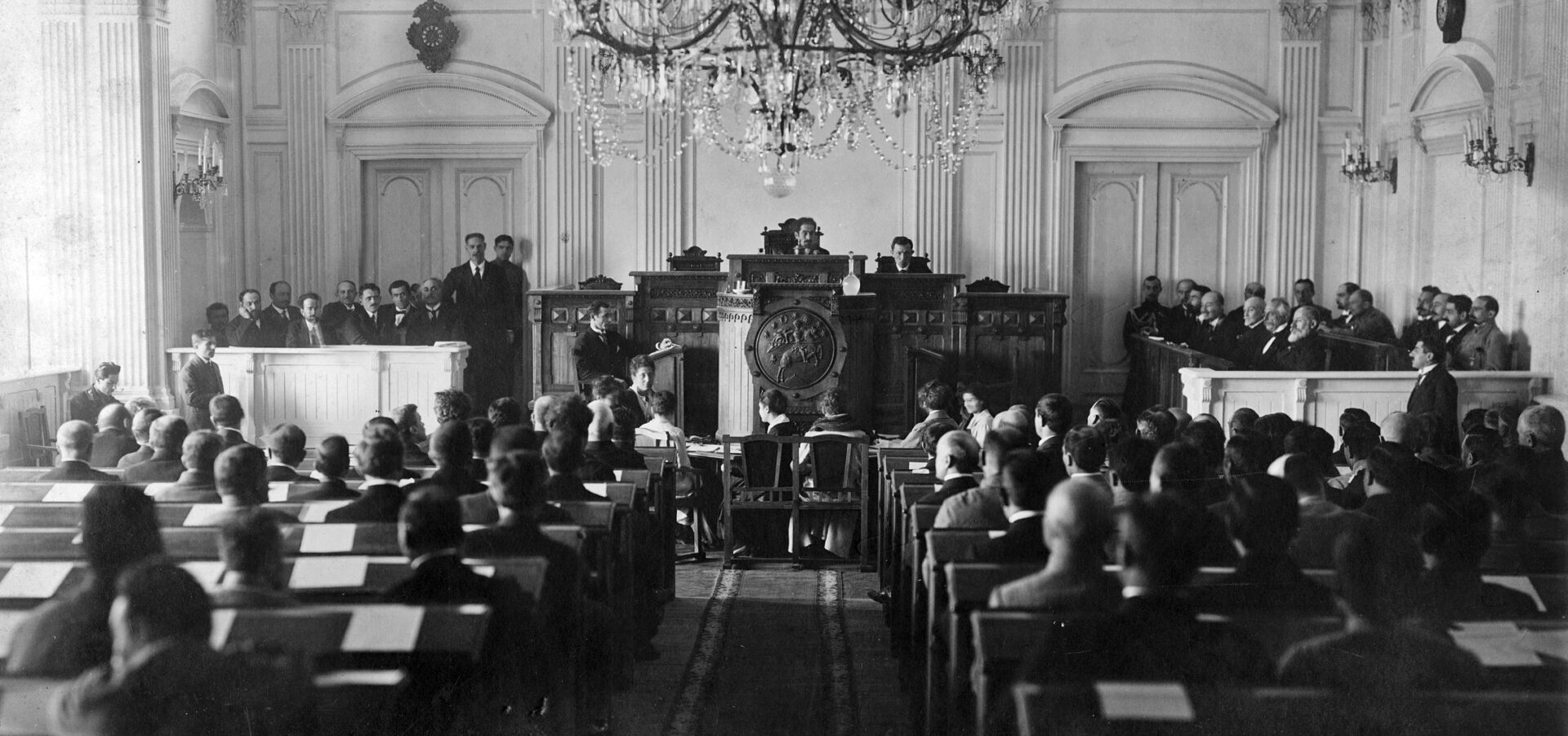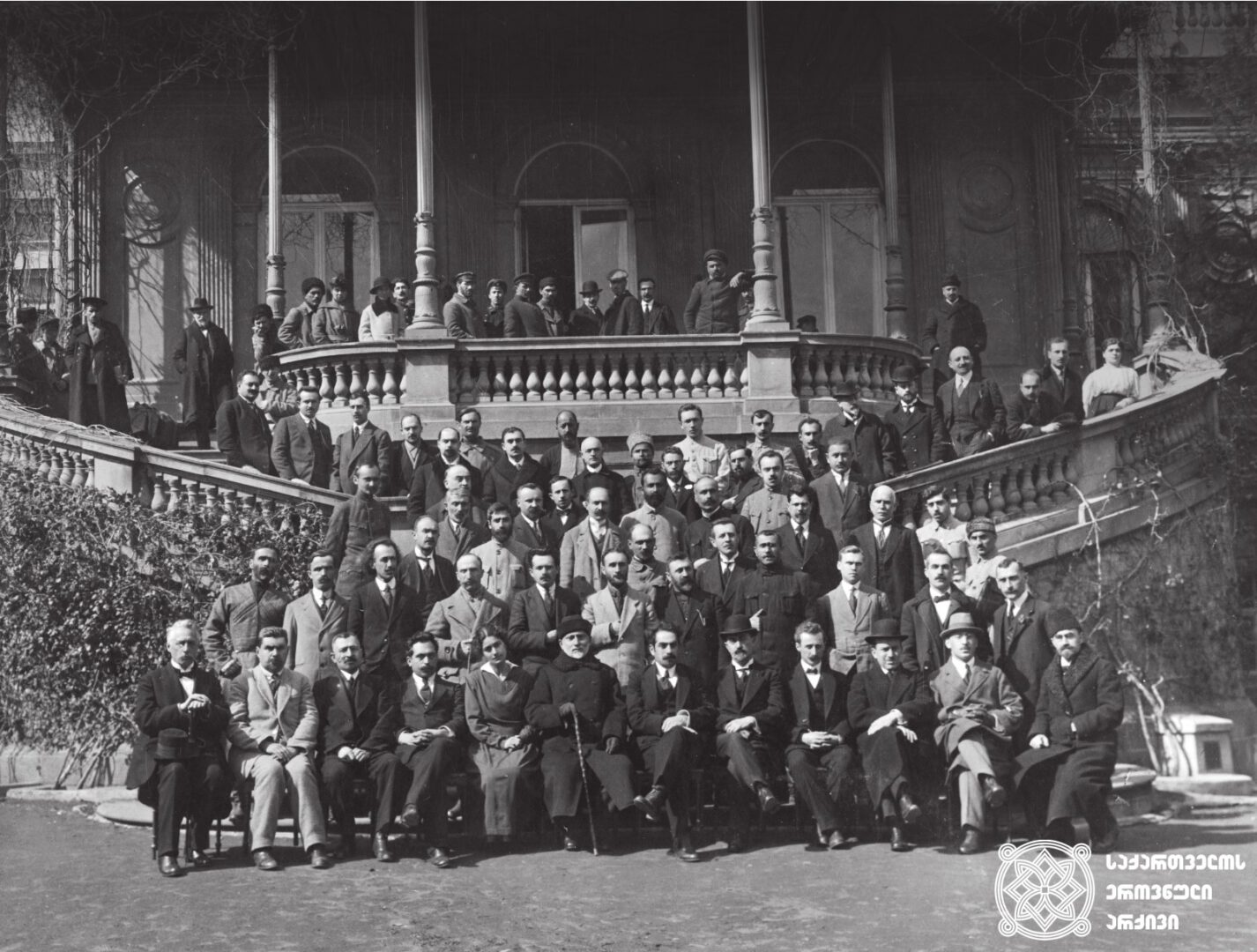Constitution of Georgia 100 – one of the oldest constitution with the European Values
Malkhaz Nakashidze, February 21, 2021
 On May 26, 1918, the Democratic Republic of Georgia declared its independence and adopted the Act of Independence of Georgia.[1] On February 21, 1921, the Constituent Assembly of Georgia adopted the Constitution of the Democratic Republic of Georgia, which defined that the permanent and unchangeable form of her political arrangement shall be the democratic Republic.[2] The drafting of the Constitution of the Democratic Republic of Georgia was started in 1918, when the National Council of Georgia established the Constitutional Commission of the Democratic Republic of Georgia. On March 18, 1919, the Constituent Assembly elected a new Constitutional Commission and work on the Constitution was continued in the Constituent Assembly of Georgia.
On May 26, 1918, the Democratic Republic of Georgia declared its independence and adopted the Act of Independence of Georgia.[1] On February 21, 1921, the Constituent Assembly of Georgia adopted the Constitution of the Democratic Republic of Georgia, which defined that the permanent and unchangeable form of her political arrangement shall be the democratic Republic.[2] The drafting of the Constitution of the Democratic Republic of Georgia was started in 1918, when the National Council of Georgia established the Constitutional Commission of the Democratic Republic of Georgia. On March 18, 1919, the Constituent Assembly elected a new Constitutional Commission and work on the Constitution was continued in the Constituent Assembly of Georgia.
The draft of the Constitution of Georgia of 1921 was based on main tendencies of world constitutionalism. It recognized all the basic principles and values of constitutional democracy for that period. The Constitution of Georgia belongs to the generation of constitutions adopted after the First World War and the following constitutions were in force in Europe for this period: Swedens 1809; Netherlands 1814 (still valid today); Norway 1814 (still valid today); Belgium 1831 (still valid today); Greece 1864; Swiss 1874; French 1875; Spain 1876; Portugal 1911; Denmark 1915; Germany 1919; Finland 1919; Austrian 1920 (reinstated in 1945, still in force today) Constitutions.
The experience of European constitutions was studied and used during the drafting of the Constitution of Georgia. Some European constitutions with the parliamentary system of government were translated and published in Georgian. For example, the Swiss Constitution of 1874 (translated and published), the French Constitutional Laws of 1875 (translated, not published), the 1919 Constitution of Germany (Weimar) (published in Georgian), Czechoslovakian 1920 Constitution (translated and published).[3]
The Constitution of Georgia of February 21, 1921 consists of 17 chapters and 149 articles:
Chapter I. General Basis
Chapter II. Citizenship
Chapter III. Rights of Citizens
Chapter IV. Parliament
Chapter V. Executive Power
Chapter VI. Judicial Power
Chapter VII. Finances of the State
Chapter VIII. Control of the State
Chapter IX. State Defense
Chapter X. Local Self-Government
Chapter XI. Autonomous Administration
Chapter XII. Education and Schools
Chapter XIII. Social and Economic Rights
Chapter XIV. Rights of National Minorities
Chapter XV. Officials of the State
Chapter XVI. Relations of State and Church
Chapter XVII. Revision of the Constitution
The Constitution of Georgia of February 21, 1921 is based on fundamental principles of Western constitutionalism:
- The principle of unamendability of the republican form of government;
- The principle of parliamentary supremacy;
- The principle of continuity of the parliament (dismissal is inadmissible);
- The principle of popular sovereignty;
- The principle of republicanism;
- The principle of secularism;
- The principle of direct democracy;
The recognition of basic human rights is especially noteworthy in the 1921 Constitution of Georgia. The Constitution provided all fundamental rights set out in the European constitutions for that period and formed the constitutional basis for their protection. For example:
- Equality before the law (Article 16);
- The death penalty is abolished (Article 19)
- Every person enjoys individual inviolability (Article 22)
- The place of residence of a citizen is inviolable (Article 28)
- Every citizen shall enjoy full liberty of conscience (Article 31)
- Freedom of speech and expression (Article 32);
- The right to assembly (Article 33)
- The right of association (Article 35)
- The right to a personal and collective petition (Article 37)
- Workers shall have the right to strike (Article 38)
- Every citizen regardless of sex shall enjoy equal political, civil, economic, and family rights 39)
- Marriage shall be based on equal rights and upon the mutual consent of husband and wife.
It should also be noted that the Constitution not only protected the rights and freedoms explicitly defined in the Constitution, but also Article 45 of the Constitution stated that “The rights and guarantees enlisted in the Constitution shall not exclude those rights and guarantees not formulated in the Constitution but per se deriving from the principles recognized by the Constitution”.
In terms of defining human rights, it should be noted that the Constitution of Georgia dedicated a special chapter 13 to socio-economic rights. Such a definition was probably related to the fact that the Social Democrats were in power in Georgia, and it was also an expression of their political ideology. It is difficult to say how the Georgian government would have been able to fulfill the obligations set out in this chapter of the Constitution, although at the declarative level it was an important statement. The main part of socio-economic rights was presented in the Constitution as follows:
- Forced expropriation or restriction of private enterprise can only take place in accordance with a special law, which determines their manner, and only for the needs of the State, public, and cultural need;
- The owners of expropriated property shall be compensated if there is no other rule stated in law;
- Small producers are a special concern of the state;
- The special concern of the republic is the prosperity of agriculture;
- Unemployed citizens shall receive assistance with employment or insurance;
- Assistance to a citizen deprived of the ability to work because of age, illness or other causes;
- The employment of minors under 16 in establishments is forbidden;
- Night work for adults and women in general is prohibited;
- Determine the minimum wage and normal working conditions;
- Special inspection of product and sanitary control independent of the employers shall be established
- The protection of female labor shall be the established by the special law
- The employment of women at dangerous work for maternity is forbidden;
- Republic and the local self-government bodies are obliged to insure the protection of mothers and children.
One of the important principles of the 1921 Constitution of Georgia was secularism. The Constitution declared Georgia a secular state. Chapter 16 of the Constitution, entitled “The State and the Church”, stated that The State and the church are separate and independent from each other (Article 142), No confession or creed enjoys special privileges (Article 143), It is forbidden to make any levies from the budget of the state or local self-government bodies for the needs of any religious order (Article 144).
Along with representative democracy, the Constitution of Georgia underlined importance to direct democracy, which was still being thoroughly considered during the discussion of the draft Constitution. The authors of the Constitution shared the Swiss constitutional experience with regard to the referendum. Article 64 of the Constitution stated that “The Parliament shall be obliged to submit any new law to a public referendum if 30,000 electors require it in writing. The rules of referendum shall be determined by law.”
One of the important values of the 1921 Constitution of Georgia should be the establishment of a proportional electoral system for the Parliament of Georgia. Establishing a fully proportional electoral system is still a matter of serious controversy in Georgia, where a mixed electoral system has been in place since the adoption of the new constitution in 1995. Article 46 of the Constitution of 1921 established that the representative body of the Georgian Republic is the Parliament of Georgia, composed of deputies elected by universal, equal, direct, secret and proportional suffrage. Every citizen, regardless of sex, enjoying all rights and being over 20 years shall have the right to take part in the elections. The Parliament shall be elected for three years.”
It should be noted that before the adoption of the Constitution, on February 14-16, 1919, the elections of the Constituent Assembly of Georgia were held by the proportional electoral system. 15 political parties participated in the elections and 4 political parties won seats in the Constituent Assembly. In particular, in the constituent assembly of 1919-1921, the Georgian Social-Democratic Workers’ Party had 109 seats, the Georgian National-Democratic Party 8, the Georgian Socialist-Revolutionary Party 5, and the Georgian Social-Federalist Party 8 seats.

The Constituent Assembly of Georgia (1919-1921)
It should be especially noted that every citizen, regardless of sex, enjoying all rights and being over 20 years shall have the right to take part in the elections. Although the Georgian parliamentary elections could not be held due to the Soviet occupation, 5 women were still elected to the Constituent Assembly of Georgia (Ana Sologashvili, Eleonora Ter-Parsegov-Makhviladze, Minadora Orjonikidze-Toroshelidze, Kristine Sharashidze, Elisabeth, Liza Nakashidze-Bolkvadze). This was a very important step forward for Georgian democracy, given that women’s suffrage was introduced much later in many democracies. Including, for example, the United States in 1920 and the United Kingdom in 1928.

The five women parliamentarians elected to the Constituent Assembly of Georgia in 1919
According to the Constitution of Georgia, the Parliament was recognized as the highest representative body of the country. The Constitution defines that the sovereignty belongs to the entire nation. The Parliament shall exercise this sovereignty within the limits fixed by the Constitution (Article 52). As already mentioned, the Parliament was elected by the proportional electoral system on the basis of universal, equal, direct suffrage, by secret ballot, for a term of three years. The Constitution defined the powers of Parliament (Article 54):
The powers of the Parliament shall be the following:
a) Legislation;
b) Supreme administration of the army of the Georgian Republic and in general of all the armed forces;
c) Declaration of war;
d) Ratification of treaties of peace, commerce, or other treaties with foreign states;
e) Amnesty;
f) Approval of the budget;
g) The right to accept internal or external loans.
h) Appointment of officials as provided by the Constitution. i) General control of the Executive Power.
According the constitution, the Executive power belongs to the Government of the Republic. The Chairman of the Government is elected by the Parliament for the period of one year. The same person can only be elected consecutively twice. The other members of the government – ministers, shall be invited by the Chairman from among the citizens who have the right to take part in parliamentary elections. Members of the Government may not hold any other position or conduct a profession. They may only be members of Parliament or of the Councils of local self-government bodies.

The cabinet of ministers of the government of the Georgian Republic in 1918-1921
The constitution defined the judiciary. According to the Constitution, there is one Supreme Court in the whole territory of the Republic of Georgia – the Senate, which is elected by the Parliament. The Highest Court of Georgia shall have the following obligations: a) To monitor over the strict enforcement of the law. b) To ascertain justice in the capacity of a court of cassation (Article 76). The Constitution established main principles of justice:
- The judiciary shall be independent and act exclusively under the law;
- Justice is rendered in the name of the Democratic Republic of Georgia;
- Judges are elected for a fixed period of time
- The hearings of the courts are public;
- Participation of jurors in the hearing;
- All serious matters regarding the penal jurisdiction, as well as political matters and offences of the press shall be considered by jury trial.
The Constitution of Georgia defined a difficult procedure for revising the Constitution. The right to initiation of entire or partial revision of the constitution shall have: a) At least one-half of the members of Parliament. b) A group of 50,000 electors (Article 145). The Constitution set a time limit from the initiative to the inclusion in the Parliamentary agenda and, consequently, for the consideration of constitutional amendments. In particular, a proposal for the revisal of the constitution can only be heard in Parliament six months after the deposition of such a proposal. (Article 146). As for the adoption, the draft public or partial revision of the Constitution A proposal or draft of the partial or entire revisal of the Constitution can only be adopted by a majority of two-thirds of the members of the Parliament. Following the adoption of the constitutional amendments in Parliament, it was decided to approve the amendments in a referendum. The constitution defined that this proposal only enters into force after the approval by the people (Article 147). Finally, it should be noted that the Constitution provided for the so-called unamendable constitutional provisions. In particular, the Constitution stated that the abolition of the form of Government of the Democratic Republic of Georgia may not be the subject of the proposal for a revision of the constitution. (Article 148). Unamendable provisions and constitutional review over the constitutional amendments are still a question of debate in Georgia. The current Constitution of Georgia does not contain such provisions.
Unfortunately, on February 15, 1921, the 11th Army of Soviet Russia invaded in Georgia, occupied the country on February 25 and Government was forced to emigrate to France. Before emigrating, the Georgian government first printed the Georgian Constitution of February 21, 1921, at Khvingia’s private printing house in Batumi.

13 Kostava st., Batumi, where the Khvingia printing house was located in 1921 and the Constitution was first printed.
The 1921 Constitution of Georgia has been terminated as a result of the Soviet occupation, although it became topical after the collapse of the Soviet Union and the restoration of Georgia’s independence. On March 25, 1993, the Parliament of Georgia adopted a resolution on the establishment of the State Constitutional Commission of Georgia and the Constitutional Commission was instructed to draft a new version of the Constitution of Georgia of February 21, 1921.[4] Nevertheless, the new constitution was finally adopted on August 24, 1995, although some changes reflected many norms and principles from the 1921 Constitution and the preamble to the Constitution stated that: „The citizens of Georgia, whose firm will is to establish a democratic social order, economic freedom, a Rule of Law based social state, to secure universally recognised human rights and freedoms, to enhance the state independence and peaceful relations with other peoples, bearing in mind the centuries-old traditions of the Statehood of the Georgian Nation and the basic principles of the Constitution of Georgia of 1921, proclaim nation-wide the present Constitution”.[5]
Although the Constitution of February 21, 1921 ceased to exist due to the Soviet occupation, it was one of the most progressive documents in the world at the time of its adoption, enshrining the fundamental values of human rights and constitutional democracy. This Constitution played an important role in the development of constitutionalism in Georgia and the values mentioned in the Constitution have been reflected in the current Constitution of Georgia.
[1] Act of Independence of Georgia, May 26, 1918
[2] Constitution of Georgia, adopted by the Constituent Assembly, February 21, 1921
[3] Beka Kantaria, Principles of Western Constitutionalism and the Legal Nature of the Form of Government in the First Georgian Constitution, Tbilisi, 2012, p. 16-18
[4] Resolution of the Parliament of Georgia on the Establishment of the State Constitutional Commission of Georgia and the Approval of the Statute of the State Constitutional Commission, Tbilisi, March 25, 1993